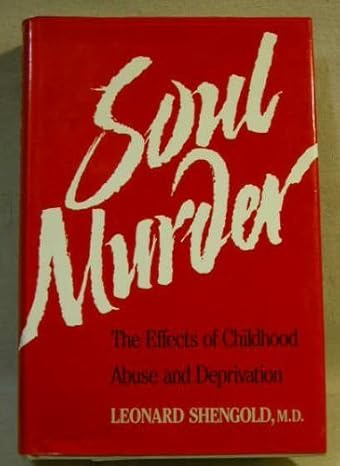Leonard Shengold’s Soul Murder: The Effects of Childhood Abuse and Deprivation examines the profound psychological damage caused by childhood abuse and neglect, using psychoanalytic theory to explore how trauma disrupts development, fosters dissociation, and impairs adult relationships. Through clinical case studies, the book highlights the enduring effects of “soul murder” while advocating for greater awareness and compassion.
Leonard Shengold’s Soul Murder: The Effects of Childhood Abuse and Deprivation explores the psychological and emotional toll of severe childhood trauma, including physical abuse, emotional neglect, and sexual exploitation. Shengold uses the term “soul murder” to describe the destructive impact such experiences can have on a child’s developing sense of self, often leading to long-lasting psychological damage.
Drawing on psychoanalytic theory and clinical case studies, Shengold illustrates how abusive environments distort children’s perceptions of reality, disrupt their capacity for forming healthy relationships, and impair their ability to trust. The book delves deeply into the mechanisms of dissociation and repression as coping strategies for abuse survivors, showing how these defence mechanisms can later contribute to self-destructive behaviours, depression, and even personality disorders in adulthood.
While primarily academic in nature, Shengold’s book has resonated with broader audiences due to its compassionate yet unflinching examination of childhood trauma’s devastating consequences.
Key Bullet Points
- Definition of “Soul Murder”: Shengold coins this term to describe the profound and often irreparable damage caused by childhood abuse and neglect.
- Focus on Psychoanalytic Framework: Uses Freudian concepts to explain how trauma disrupts ego development and leads to long-term psychological effects.
- Case Studies: The book provides in-depth analyses of real-life cases to illustrate theoretical points.
- Mechanisms of Survival: Discusses dissociation, repression, and denial as psychological defences that help children survive abuse but can impair functioning in later life.
- Impact on Adult Life: Explores how childhood trauma manifests as difficulties in relationships, trust issues, and psychological disorders.
- Compassionate Tone: Shengold demonstrates empathy for survivors while maintaining a clinical perspective.
- Call to Awareness: Advocates for recognizing and addressing the hidden scars of childhood abuse within families, educational settings, and therapeutic environments.
Critique
Strengths
- Groundbreaking Terminology: The concept of “soul murder” is evocative and effective in capturing the depth of trauma’s impact.
- Clinical Insights: Shengold’s psychoanalytic expertise provides valuable insights into the mechanisms of trauma and survival.
- Case Study Approach: Real-life examples make the abstract theoretical concepts more relatable and impactful.
- Compassionate Advocacy: The book sensitively addresses a difficult topic, balancing scholarly analysis with a call for compassion and change.
Weaknesses
- Heavy Psychoanalytic Bias: Shengold’s reliance on Freudian theory may feel outdated to readers who favour contemporary psychological frameworks like cognitive-behavioural therapy or neuroscience.
- Limited Practical Solutions: The book focuses heavily on the causes and effects of trauma but offers limited guidance on healing and recovery.
- Dense Academic Style: While insightful, the prose may alienate non-academic readers or those without a background in psychoanalysis.
- Narrow Scope: The exclusive focus on childhood abuse and deprivation overlooks other forms of trauma that can have similar effects.
Overall Evaluation: Soul Murder is a deeply insightful and empathetic exploration of childhood trauma, particularly valuable for its pioneering terminology and psychoanalytic depth. However, its focus on Freudian theory and lack of practical recovery tools may limit its appeal and utility for some readers, especially those seeking actionable advice.
Conclusion
Leonard Shengold’s Soul Murder: The Effects of Childhood Abuse and Deprivation remains a deeply impactful exploration of the devastating consequences of childhood trauma. By coining the evocative term “soul murder,” Shengold brings attention to the profound emotional and psychological scars left by abuse and neglect. His work bridges clinical insight with compassion, shedding light on how survival mechanisms formed in response to trauma can echo throughout a survivor’s life. While rooted in psychoanalytic theory, the book’s overarching message transcends academic frameworks: the necessity of recognizing, understanding, and addressing childhood trauma to pave the way for healing and prevention. Shengold’s contributions challenge society to confront the hidden wounds of abuse, ensuring survivors are seen, supported, and offered pathways to recovery.
Bibliography of Leonard Shengold
- Shengold, Leonard.Soul Murder: The Effects of Childhood Abuse and Deprivation. New York: Yale University Press, 1989.
- A seminal work exploring the long-term psychological effects of childhood trauma through a psychoanalytic lens.
- Shengold, Leonard.Soul Murder Revisited: Thoughts About Therapy, Hate, Love, and Memory. New York: Yale University Press, 1999.
- A follow-up to Soul Murder, addressing therapeutic approaches and reflections on trauma, memory, and recovery.
- Shengold, Leonard.Haunted by Parents. New Haven: Yale University Press, 2006.
- A study of the lingering influence of parents, particularly harmful ones, on adult psychological development and behaviour.
- Shengold, Leonard.Delusions of Everyday Life. New Haven: Yale University Press, 1995.
- An examination of how delusional thinking manifests in ordinary life, informed by psychoanalytic insights.
